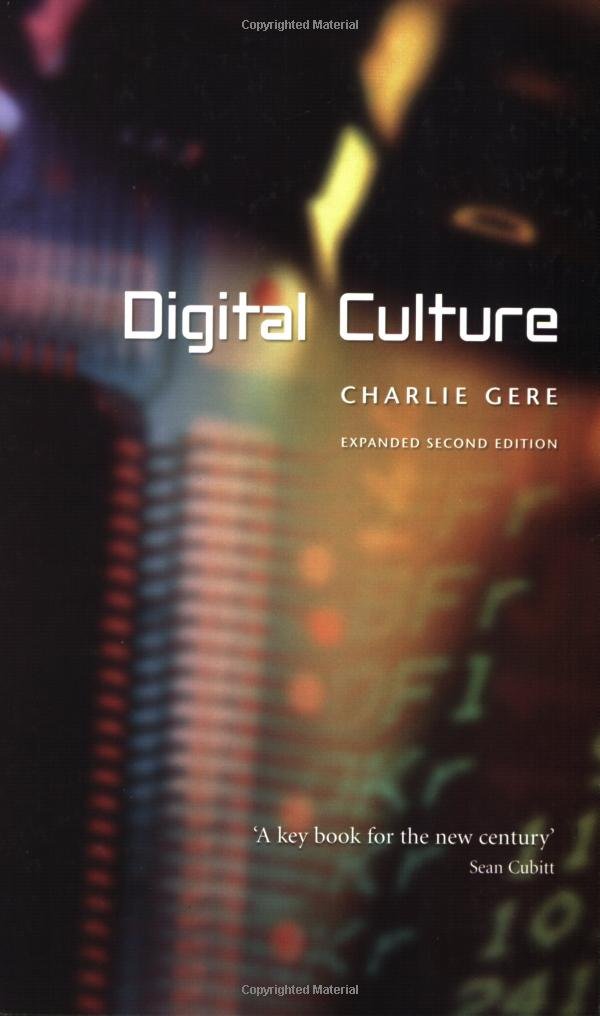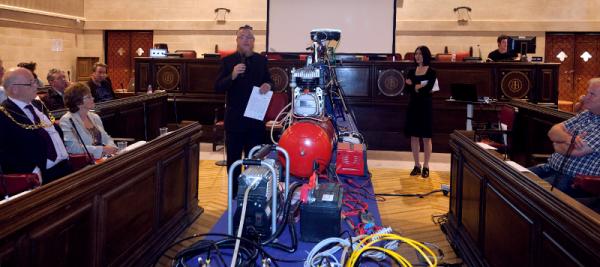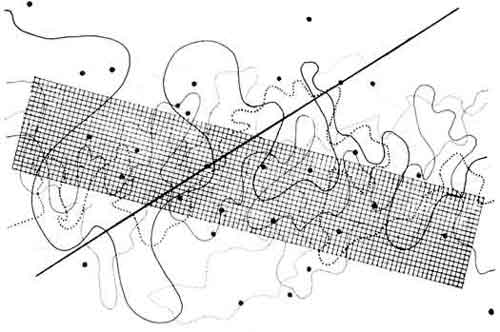



Charlie Gere is a Media Theory and History professor in the Lancaster Institute for Contemporary Arts, Lancaster University. Co-curator of FutureEverybody, the 2012 FutureEverything exhibition in Manchester. In 2007 he co-curated Feedback, a major exhibition on art responsive to instructions, input, or its environment, in Gijon, Northern Spain. He has given talks at many major arts institutions, including the Centre de Cultura Contemporània de Barcelona, the Architectural League in New York, Tate Britain, and Tate Modern. Gere’s new book, Community without Community in Digital Culture (Palgrave MacMillan, 2012), is out now.
Previous titles include: Digital Culture (Reaktion Books, 2002), Art, Time and Technology (Berg, 2006), Non-relational Aesthetics, with Michael Corris (Artwords, 2009). Gere was co-editor of White Heat Cold Logic (MIT Press, 2009), and Art Practice in a Digital Culture (Ashgate, 2010), as well as writing many papers on questions of technology, media and art. He is also co-editing with Robin Boast an anthology entitled Allegories of the Information Age (forthcoming).
Marc Garrett: Digital Culture was originally published in 2002, which happens to be the version I’ve had all these years. In 2008 it was republished, revised and expanded. Now the book has an extra chapter ‘Digital Culture in the Twenty-first Century’. Of course, we already know that digital technology and society has changed dramatically since 2002. So, what themes and historical contexts did you choose, as necessary to include in this new and last chapter?

Charlie Gere: What happened after the first edition’s publication was of course, the rise of so-called Web 2:0, which was simply the greater exploitation of the reciprocal possibilities of the Web. I tried to reflect on how this reciprocity was visible beyond the Web itself and was becoming part of a more general culture of engagement and exchange, not that I share some of the more utopian visions of this phenomenon. Indeed, in my new book Community without Community in Digital Culture, I try to counter the, for me, more naive visions of community in relation to digital technology. I advocate a more ‘non-relational’ approach that does not deny the transformative effects of new media in terms of community but thinks of it more in terms of hospitality to the other.
MG: Many of the artists we have worked with are using new media to explore and critique the utopian assumptions you discuss: YOHA, IOCOSE, Liz Sterry, M.I.G (Men In Grey, Julian Oliver and Danja Vasiliev), Heath Bunting, Face to facebook (Paolo Cirio and Alessandro Ludovico), Annie Abrahams and more. Each of them work in a deeply relational way to intervene in the mythologies projected about digital technology; and, with a knowingly crtical eye of the technical limitations and the social controls at work when using networked technology. At different levels, all are producing work that ‘consciously’ incoporate relational contexts, in some way or another, this includes ideas and approaches with autonomy as part of their art, but not necessarily advocating technology as a singular, saving grace.
How do you view the role of this practice in the context of the wider corporate and state impact on the way technical cultures are evolving. How do you see the notion of hospitality working between the arts and these other more mainstream cultures?
CG: I greatly admire and like the work of the artists you mention and others doing similar things. For me they exemplify the complexity of the idea of hospitality. In general the Web is about exchange, whether that of money for goods, social links and relational exchanges in social networks, or the exchange of speech and dialogue in on-line fora. The work of these artists refuses this demand for exchange and profit within a restricted economy. Thus they are in a sense parasitical on the Web. The word ‘parasite’ comes from ‘para sitos’, meaning ‘beside the grain’, and refers to those animals that take advantage of grain stores to feed. They are the creatures to who must be offered hospitality, as a gift, without expectation of return, which means that while they are bound up with the technological systems that comprise the Web, they are not part of the restricted economy of exchange, profit, and return that is at the heart of capitalism, and to which everything else ends up being subordinated and subsumed. Thus they find an enclave away from total subsumption not outside of the market, but at its technical core.


MG: Many are aware that technology and digital culture have changed the world we live in and appreciate their immediate effects on our everyday behaviours and situations. But there is a bigger story to tell, and history can offer us insightful glimpses, important clues and ways into this story about our relationship with technology and digital culture. One of the arguments outlined in your book ‘Digital Culture’ is that digital culture is neither radical, new nor technologically driven. With this in mind, which past developments do we need to acknowledge and be reminded of and why?
CG: For me the emergence of digital technology is part of a much longer story of abstraction, codification, quantification and mathematisation that can be traced back to numerous points in the history of the West, from Ancient Greece, to early Modernity to the rise of industrial capitalism. Here one might think of Heidegger’s use of ‘cybernetics’, a word we normally associate with post-war computing culture, to describe the technology and calculative enframing of modern society which he traces back to the Ancient Greeks and especially to Plato. I am not a particular advocate of digital technology, and while I appreciate its uses, I also think we must try to be aware of how it determines the way in which we think, and in which we conceive of the world. Above all we should not regard it as merely a conduit to an uncomplicated world simply out there, but rather the means by which a particular world comes to be for us. That said, this is very hard, given that in my view, and to adapt a well-known phrase from Derrida, il n’y a pas de hors-media, there’s no Archimedean point outside of our medial condition, from which we can understand it as from a god’s eye view. ‘Media determine our situation’ as Friedrich Kittler put it.
MG: In Digital Culture, you write about the composer John Cage and how he “has had the most profound influence on our digital culture”, and how his influence has opened up various different avenues of creative engagement. And, many of his ideas on interactivity and multi-media not only “have repercussions in the art world”, but also a strong influence on how computers are used as a medium. Which art movements in particular did he influence and what kind of legacy did he leave for others in relation to computers?
CG: Actually Cage’s influence on those using computers in the arts is probably less to do with what he himself did with such technology and more to do with his use of aleatory methods in many his different projects across many artforms. Also there is something about Cage’s own refusal of a normative Western subjectivity that is also consonant with aspects of our hyper-technologised existence with its emphasis on decentering the individual. Both the refusal of such subjectivity and the aleatory work together to produce a new model of the artist as conduit of contingent social forces rather than protean demi-urge or genius.

MG: Your new book ‘Community without Community in Digital Culture’, has come out at the same time as Geert Lovink’s ‘Networks Without A Cause: A critique of Social Media’. Lovink asks “How do we overcome this paradoxical era of hyped-up individualization that results precisely in the algorithmic outsourcing of the self? How do we determine significance outside of the celebrity paradigm and instead use intelligence to identify what’s at stake?” [1]
Where are your thoughts in regard to Lovink’s question, and does it relate to what you propose in terms of “hospitality to the other?”
CG: I haven’t read Geert’s book, yet at least… But I am highly sympathetic to what I take to be his position. My view is that the Web is part of a broader set of developments that apparently concern relationally, but actually emphasize the sovereign individual and autonomous subject of modernity, as well as promoting spectacular and image-bound forms of presentation and relation. The problem is that one alternative to this individualization is a kind of fascistic identification with the mass, in the form of fusion that negates the individual. A solution maybe to engage with the idea of the other in terms of difference, as both relational and separate, and yet also that which we depend on for our identity in a process of differentiation; thus the idea of hospitality as a reception of the other in difference.
MG: Community without Community in Digital Culture, is a curious title. It proposes contradictory meanings and these contradictions are clearly explained in the introduction. Although, the last sentence says “In this such technologies are part of the history of the death of God, the loss of an overarching metaphysical framework which would bind us together in some form of relation or communion. This can be understood in terms of contingency, which has the same root as contact.”
Could you unpack this last sentence for us, I’m especially interested in what contingency means to you?
CG: I owe my understanding of contingency to the work of philosopher Quentin Meillassoux, whose book After Finitude is causing a stir. Meillassoux is one of a small number of young philosophers sometimes grouped together under the name ‘speculative realism’, mostly because of their shared hostility to what they call ‘Kantian correlationism’, the idea that there can be no subject-independent knowledge of objects. Meillassoux follows the work of David Hume, who questioned the whole notion of causation; how one can demonstrate that, all things being equal, one thing will also cause another. For Hume causation is a question of inductive reasoning, in that we can posit causation on the grounds of previous experience. Meillassoux pushes the implications of Hume’s critique of causation to a point beyond Hume’s own solution, to propose the only necessity is that of contingency, and that everything could be otherwise, or what Meillassoux calls ‘hyperchaos’.
![Community without Community in Digital Culture [Hardcover]. Dr Charlie Gere. Palgrave Macmillan (2012) http://www.barnesandnoble.com/w/community-without-community-in-digital-culture-charlie-gere/1110025572 See on Amazon.](http://www.furtherfield.org/wp-content/uploads/2012/09/179510500.jpg)
I use his ideas to think through the implications of the ‘digital’. According to the Oxford English Dictionary ‘digital’ has a number of meanings, including ‘[O]f, pertaining to, using or being a digit’, meaning one of the ‘ten Arabic numerals from 0 to 9, especially when part of a number’, and also ‘designating a computer which operates on date in the form of digits or similar discrete data… Designating or pertaining to a recording in which the original signal is represented by the spacing between pulses rather than by a wave, to make it less susceptible to degradation’ (the word for data in the form of a wave being ‘analog’).
As well as referring to discrete data the dictionary also defines ‘digital’ as ‘[O]f or pertaining to a finger or fingers’ and [R]esembling a finger or the hollow impression made by one’, thus by extension the hand, grasping, touching and so on. Much of the book concerns deconstructing the ‘haptocentric’ implications of contact, and communication, especially in relation to the claims made for social networks, and to engage with what I understand as the relation between ‘contact’ and contingency’. ‘Contingency’ is derived from the Latin con + tangere, to touch. ‘Contingency’ enables us think through the implications of the term digital, by acknowledging both its relation to the hand and touch and also to the openness and blindness to the future that is a concomitant part of our digital culture after the death of God.
MG: What other subjects can we expect to read about in the publication?
CG: Touch in Aristotle and medieval theology, cave painting, mail art, Darwin and Dawkins, Luther Blissett, On Kawara, Frank Stella, Bartleby the Scrivener, Christianity – among other things… oh, and a lot of Derrida.
MG: If there is a message you’d like to send to the world, as it carries on regardless with its “permanent exposure of life, of all lives, to ‘all-out’ control […] thanks to computer technology” [2] (Virilio 2000), and it was printed on a banner, or on a billboard in the streets, what would it be?
I am reading Blanchot at the moment, so perhaps something like ‘the disaster has already happened’ (it’s suitably enigmatic to annoy people).
<———————————- The End (for now) ——————————>